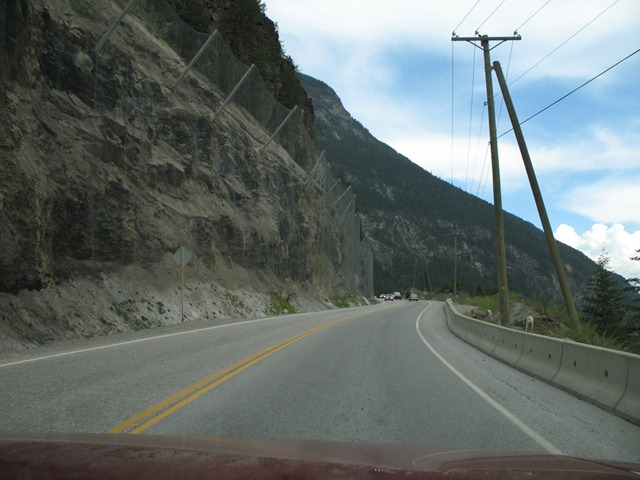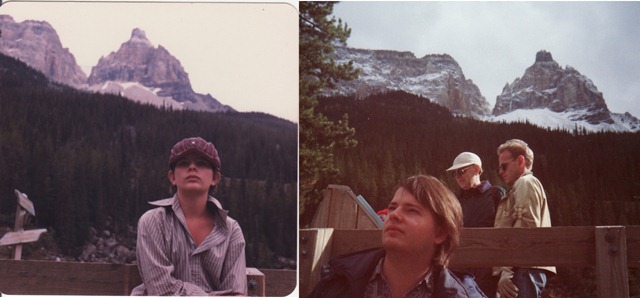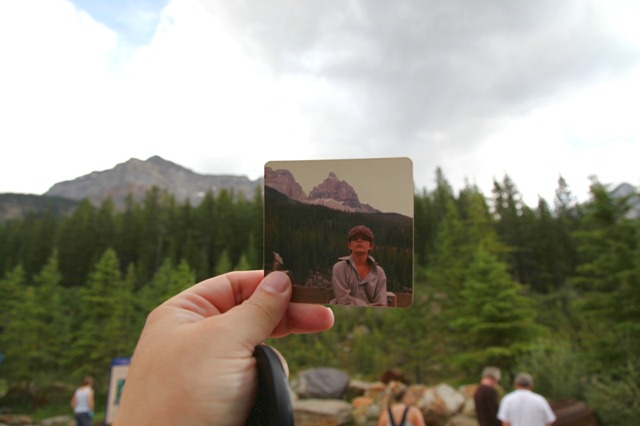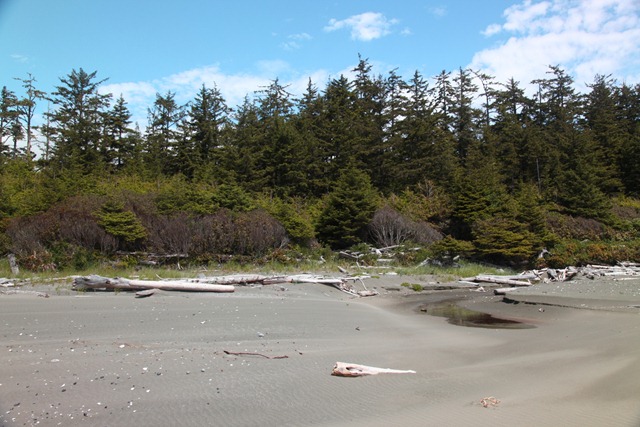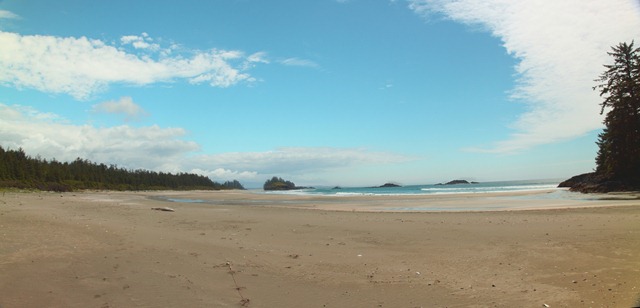Day 2: to Calgary
Road trip log for 2011/08/10.
Stayed at the Three Valley Lake Chateau last night, for the first time. It’s not bad. I got a fourth-floor room with a view of the lake. Here’s a panorama of the view from my balcony:
The room was small but adequate. It was pretty hot; I could get a nice breeze going through by leaving both doors open, but obviously that couldn’t go on all night – I also had to close the balcony door because there was too much noise from the highway otherwise. Fortunately the room included a floor fan so I left that running all night.
Could have slept better but I felt OK during the day.
There’s a “Ghost Town” tourist trap attached to the resort that I had always wondered about in passing. Decided to have a look this morning since it was half price for guests. It’s actually worthwhile – I only spent an hour photographing stuff quickly, but I could spend a whole afternoon there. It’s basically an enormous antique collection, including stuff up to train cars, amassed by the founders of the resort. It covers 4 acres and includes 14 buildings.
Stopped at Revelstoke for breakfast, but my favourite breakfast place, Main Street Cafe, was closed today. Had to settle for a crappy sandwich from Timmy’s.
Stopped for a walk at the Giant Cedars boardwalk, and was shocked to discover that my memories of it are in error – the Cathedral Grove on Vancouver Island is actually much more impressive.
Stopped for lunch at the Natural Bridge park near Field – basically a waterfall that flows under a rock bridge – nothing spectacular but a popular curiosity.
Lots of road construction between Golden and Banff – I’m pleased that they seem to be working of fixing that scary dangerous section just east of Golden. My dash-cam caught some young bighorn sheep beside the road on that section – a common sight there. view full size and look by the telephone pole:
Also stopped at the Spiral Tunnels to do some rephotography. Here are two old pictures of me there. The left is, I think, from when I was 12 (I was a much better dresser back then, I’m sure you’ll agree). The right was from my early 20s I think.
There was nobody with me this time to properly repro the photo, so instead I did the other kind of rephotography: picture-in-picture:
For those who don’t know, Spiral Tunnels is just that – a pair of spiral train tunnels that help trains negotiate a difficult pass. There is a viewing area where you can often see the same train going in and coming out of a tunnel at once, crossing over itself in the process. The novelty wore off after the first visit though.
Lots of construction delays up to Banff, and heavy rains in that area too, but after that an uneventful drive into Calgary.
I took about 400 pictures today but haven’t had time to go through them. Will perhaps post some another time.
[gmap file=”__UPLOAD__/2011/08/20110810.kml” visible=”true” width=”80%” zoom=”auto” center=”files” type=”satellite”]
Backing up a bit
I actually started (and, in a sense, finished) this road trip back in June, when I took a short vacation at Long Beach. Living in Vancouver doesn’t put me on the west coast proper, so I thought it would be more correct to film my timelapse movie starting and ending at Tofino. It also served as a road test for my new timelapse recording technique.
But more importantly, Long Beach is where I began. In 1971, my parents were living with a small group of hippies in Schooner Cove, which is just south of Tofino. My parents had built themselves a tree house out of driftwood, and that’s where I was conceived. I went back to try and find my spawn point.
Schooner Cove is still somewhat isloated. There is no road and no established trail going there anymore; you have to walk on the beach, and high tide cuts off access so you have to be careful about timing.
There is no sign of former habitation; the houses that were there were removed, and everything else is overgrown. I believe I did locate the old trail head that led to my parents’ treehouse though – the house would have been a short walk in here, just to the left of the stream:
And here is the view of Schooner Cove looking south from this point:
Beautiful. No sign of life. Just the sound of the wind and the waves. I could totally see camping out here.
See that rock just left of center? My father crashed his Morris Minor there. He was driving home across the beach when a wave swamped the car, and he wasn’t able to extricate it. He had to abandon it, and the waves tore it apart. When I was young (12, I think) my mother brought me back here and there was still a lump of rust there that would have been the engine block. No sign of it this visit though – if anything remains, it was under five feet of sand.
I love Long Beach, but my memories of it are recent – a few from that visit when I was 12, and most from visits in the last few years. My parents left the area before I was born – living on a boat north of Sechelt for a while, then around the time of my birth living in Vancouver. I was born at St. Paul’s hospital downtown Vancouver, where by a sad coincidence my friend Erik Torstensson was treated just before he passed away a couple of years ago.
Coming back toward Vancouver, I passed through Coombs, home of the unjustifiably world-famous “place with the goats on the roof”. It’s just a tourist gift shop with that one gimmick, but I lived there for a while. I think it was related to the Long Beach visit when I was 12. A friend of the family had offered my mother a job staffing a booth at the tourist mall going up next to the goat place. Here’s what it looks like now:
It wasn’t as well developed back then though – still early days, with just wood boardwalks on mud. Anyway, we lived in a camping trailer next to the goat place while this business tried to take flight, and I was bored out of my mind. Thankfully there was an arcade here at the time, and I spent much time playing Trojan (still have the first-level music memorized), but money was extremely tight and I really had to beg for that occasional quarter. I was really glad I had brought a few of my favorite comics with me.
After a month, things didn’t seem to be picking up and no money was coming in, so we bailed out. It kind of soured our relationship with that family for a while, but before we left we stayed with them for a a few days and I got to play with their Coleco Adam (only time I ever got my paws on one) and that was also the first time I got to play the excellent Pitfall II on the Atari VCS – spent many hours on that game.
And here’s the result of a little program I cooked up to correlate my GPS track with my iTunes recently played list, and mark up my travel maps with the music I was listening to at the time:
[gmap type=”satellite” width=”80%” zoom=”auto” center=”files” file=”__UPLOAD__/2011/08/20110626.kml” visible=”true”]
Memory Lane
Tomorrow I embark on the longest trip of my life so far: driving from the west coast of Canada to the east coast and back. I have traveled a lot in my life, but never this much at once, and I’ve been unusually non-nomadic the last ten years.
I’ve been talking about doing this for a few years. Actually, going back and looking at my painfully ’90s pre-blogosphere website, I first mentioned the idea of this trip in 2001. At the time my friend Phloem described the idea as “Travels with Samantha Lite”. (TwS is a good read, BTW. Go!)
So ten years I’ve been planning this. Wow, time flies. But while the specific route I intend to follow has meandered a bit since 2001, the goals have not changed at all. I waited this long because now I’m eligible for my employer’s sabbatical program – I get an extra seven weeks of paid vacation this year, and that really helps; this is going to be an expensive trip.
The timing kind of works out well in other ways too – for one thing, Labrador just completed their first through road last year, which opens up the possibility of driving through that pseudo-province. For another, I turn 40 next year, so this can count as my mid-expected-lifespan semi-crisis extravaganza. I didn’t actually think of the trip in that context until just recently, but the intended theme does fit:
The main point of the trip is to revisit all the places I remember from my youth. I want to rephotograph old photos, photograph places I remember but don’t currently have photos of, and generally just refresh all those old memories and steep in nostalgia for a while.
As I wrote when I first described the idea: “I don’t want to become like a goldfish, only able to remember being as I currently am. Change is core to my life. Forgetting who I used to be is a kind of stagnation.” My memories are most strongly keyed by places; my hope is that revisiting old places will remind me of parts of myself that are, at present, buried.
Thinking of it from the midlife context, it will also serve to nicely summarize and cap off my life so far. I’ve been thinking I want to change my direction, so this should help get some closure on my larval stage.
A secondary purpose of the trip is to do some tourism stuff – visit places along the way that I haven’t visited before. That takes a definite back seat to the primary purpose though.
I will also be attempting to film a time lapse movie of the coast-to-coast drive in both directions. I did one for the trip between Vancouver and Calgary a few years ago, and learned a bunch from it. This one will be better, provided the equipment can take the punishment (digital camera shutters are not rated for the number of operations that will occur on this trip).
I’m very excited about this trip, and also a bit scared. I’ve actually been having intense dreams and not a few nightmares about it for weeks now. There is so much that could go wrong. I could have an accident or a breakdown. Some kind of financial setback. I could get too sick to drive, or even just too sick to enjoy the trip. By far the most likely problem is that I could simply get too exhausted to go on; I have sleep trouble even at home and especially tend not to sleep well in hotels.
But I’m not going to let any of that stop me. I’ve got too much invested now, and I’d intensely regret backing down. I’ve taken all possible precautions and my past travel history is spotless, so I tell myself my fears are unreasonable and press on.
Bloggination will be perpetrated here as time and net connectivity permit. I do not expect to be booking any face or plussing any googles while on this trip.
The Panopticon is here, and it’s us
You may have heard about some so-called riots that occurred in Vancouver recently, following the Stanley Cup playoffs. What I found interesting about this event is that there was no need for police surveillance to identify the people committing acts of vandalism. The crowd did it. Almost everyone carries some form of digital camera these days; millions of photos and videos were taken that evening, some of them by the vandals themselves.
Many of the people who were there were displeased by the actions of the rioters and were only too happy to post their photos on public websites and share them with the police in order to help identify the wrongdoers. Some of the perpetrators were positively identified, named in public, and themselves and their families shamed. They squirmed uncomfortably in the public spotlight. Some of them dug themselves in deeper by making stupid comments in response. I can’t help but think that the repercussions of all this for those who were identified will dog them for some time, and though that seems good in some cases, in others it might be unfair. Will some kids find it difficult to get a job just because they happened to be caught in a photo with someone much worse?
But what disturbs me about this sort of public self-surveillance is that I kind of approve of it, at least as exercised during the riot. I would much rather have random strangers taking pictures of each other and me than have the police taking pictures of them and me. I find this hard to reconcile with my self-image as a rabid privacy advocate, though that was already somewhat in conflict with my photographer status. What I don’t want to see happen is people using this sort of data to fuel vigilante justice.
Oh, and: This is a hell of a lot cheaper than the British solution of having manned surveillance cameras every five feet.
A cow-orker showed me this ten gigapixel composite photo of downtown Vancouver. It’s really nice. But if you zoom right in, you can easily recognize people driving cars in the foreground, and you can see into hundreds of living rooms in the apartments and condos downtown in the City of Glass. While this is all perfectly legal (and as a photographer I’m glad it’s so), it does sort of bother me. What if someone in one of those cars was not supposed to be there at that time? What if someone in one of those living rooms was caught doing something embarassing? If it were me taking that picture, I would have blurred out all the faces and license plates, and checked the condo windows.
And indeed I have done and will do something similar; I sometimes record timelapse movies of my road trips from the dashboard of my vehicle. Before I show anyone the finished movie, I go through and blur out all recognizable faces and license plates in the video. It’s a ton of work, but I feel compelled to do it out of respect for peoples’ privacy, even though I’m not legally required to do it. I would hate for someone to get into trouble because I happened to document their presence at some particular coordinates in space-time.
I follow some people on Twitter who habitually post “checkin” messages when they arrive at favorite stores or restaurants. They use services like Yelp and Foursquare to do this, and it only takes a moment to do with smartphone integration. These messages arrive more or less instantly, and usually contain the address and website of the place they’re at. So right there I can correlate a person’s location at that point in time and their shopping or dining preferences – and since Twitter has an API, I could potentially do that automatically for large numbers of people and perhaps discover some interesting patterns.
It’d be a great stalker tool – find out where your special someone likes to go and what days and times of day they tend to go there – and get notification possibly in time to actually find them. I think the actual intended application (or selling point, anyway) is that it could let friends discover each others’ presence nearby and get together for company, and that’s great, but that effect seems, in my perception, tiny in comparison to the potential marketing fallout (somebody is gathering this demographic data, I guarantee). I won’t go so far as to say it’s an invasion of privacy since posting these checkin messages is voluntary, but it still makes me a little uneasy.
Satellite and aerial photographic maps. I love them a bunch, but if you have a unique vehicle everyone in the world now knows where you park it, and if you have something to hide on your property then you’d better make sure it’s concealed from the air too.
The recent Canada Post strike forced me to switch to paying my bills online. I love it. It’s quicker and more convenient, and no more messing around with paper records – I can get my bills already in PDF form rather than having to scan & shred them later. My bank already knows who I give money to, but now they know it in a much more automated way. It wouldn’t be hard for someone on the inside to make and secretly sell a list of everyone who has sent money to Organization X. It doesn’t matter that they’re not allowed to do that, because once it’s done the potential damage is enormous. And how about security? I now have accounts on a lot more websites – accounts that contain important personal information. More passwords means more risk of cracker stealing my identity and selling it – and while I minimize that by making all payments through my bank’s website, their security is actually among the worst – imagine not allowing passwords longer than 8 characters!
Social networks. Especially FaceBook. They are useful and I use them; they help me relocate old friends and keep in touch with current ones, and are a great source of interesting news. They also encourage us to share personal information about ourselves. The selling point is that it helps us facilitate our interactions with friends and strangers, and it does, but there’s demographic gold in them thar hills. You better believe someone is collecting and selling it and someone else is correlating it all.
Which leads to targeted advertising. I hate advertising passionately, but why?
- It’s trying to get my money.
- It’s often very repetitive; they’re always trying to sell me things I already know exist or that I could easily discover if I had a need for them.
- It doesn’t work anyway; they’re almost always trying to sell me something I don’t want.
But the reason marketers collect demographic information is in order to target their advertising – make it so people see ads that are more likely to be of interest to them, thus increasing sales and increasing the effectiveness of the advertising dollar.
But what I recently realized is that targeted advertising, if done right, actually eliminates all three of the above annoyances. If the ads that are presented to be really are selected based on my interests, then (3) they might try to sell me something I actually do want, (2) they might inform me of a product I didn’t know existed and therefore (1) make me glad to spend the money.
So targeted advertising isn’t really a big objection to demographic data collection any more, at least for me; if I must be subjected to advertising, this at least increases its utility. But that still leaves the disturbing and difficult to predict correlations that might pop out of all that poorly protected data. I don’t actually know what they might be, but I fear the worst. Suppose the police state to the south or our own dear nanny state demands access to that data and starts scrutinizing people based on suspicions arising from the correlations they find there? If you buy a lot of gardening supplies and household cleaning products, that must mean you’re a terra-ist, right?
I’m kind of jealous of kids growing up today in the world of ubiquitous digital cameras. I have only spotty photographic records of my childhood, and no audio or video recordings from back then. Without those memory aids most of my youthful memories are lost – few memories without photo backup have survived in my aging brain. While today’s children will be subject to many more humiliating displays of baby photos by parents to their prospective girl/boyfriends, I think they’ll find as they get older that the value of having the non-embarrassing memory aids more than compensates for it. Of course, there are some extreme examples…
No, I’m not approaching a conclusion of any sort here. Just tossing out some things that have been on my rabid privacy-advocate mind lately. I’ve had more occasion than usual lately to ponder issues of privacy and surveilance, and just thought I’d share some of those ponderings.
Wait. I don’t have a conclusion, but I do sort of have a summarizing feeling: The rapid growth of personal data collection, detection technology and ubiquitous digital cameras, combined with the rapid growth of data correlation and automated recognition capabilities, puts us in an era of rapidly accelerating erosion of privacy. So far it’s not enough to really alarm me, and in a few ways it has benefited me, but I worry that maybe my lack of alarm a stupid “frog in warming water” mistake on my part. I just hope we don’t all find ourselves in a bad place one day because of this.
TED round 3
More interesting talks:
Neuroscience:
Kwabena Boahen on a computer that works like the brain – Detailed comparison between transistors and neural ion channels, with application to brain enhancement.
Julian Treasure: The 4 ways sound affects us – Hell yes. More awareness like this please!
Sociology:
Mike Rowe celebrates dirty jobs – Basically a rant about American laziness, but the story is interesting. There is some truth to his conclusion but I think he’s over-romanticizing.
Ian Dunbar on dog-friendly dog training – Magical truth-saying! I’m glad to see some progress in the science of dog training.
Deb Roy: The birth of a word – Some really interesting data visualizations here, and he makes me envy (somewhat) kids growing up today in the world of ubiquitous digital photography. While it means having evidence to suppress, it also means having great memory aids.
Christopher “moot” Poole: The case for anonymity online – I don’t think he really makes much of a case for anything – indeed he talks about some things that could be called invasion of privacy. But it is interesting to hear the back-story of a little-understood web phenomenon.
Malcolm McLaren: Authentic creativity vs. karaoke culture – Long but good. At first it’s not clear where he’s going, but it comes together when he gets to his art school story. He’s on about one of the things that really bothers me about western pop culture.
Amber Case: We are all cyborgs now – I love her visualization of the mass of the data we carry around with us.
Environmentalism:
James Balog: Time-lapse proof of extreme ice loss – Standard-issue environmental message aside, the time-lapse movies of glaciers moving are worth watching.
Michael Pollan gives a plant’s-eye view – A nice counterpoint to the typical view of man exploiting nature.
Technology:
David Pogue on cool phone tricks – Grab bag of useful clues about cell phone services.
Physics:
Aaron O’Connell: Making sense of a visible quantum object – Science!
Nanotechnology:
Angela Belcher: Using nature to grow batteries – Progress!
Law:
Philip K. Howard: Four ways to fix a broken legal system – “You can’t run a society by the lowest common denominator.” HELL YEAH!
Larry Lessig on laws that choke creativity – Basically about remix culture versus IP law.
Barry Schwartz on our loss of wisdom – A great rant about how mindless rule-following and poorly constructed incentives have led to some of the social and legal insanity we suffer today.
Miscellaneous:
Benjamin Wallace on the price of happiness – Gets to my problem with a lot of “gourmet” culture, namely mistaking attributes like rare, special and expensive for the attribute “good”.

